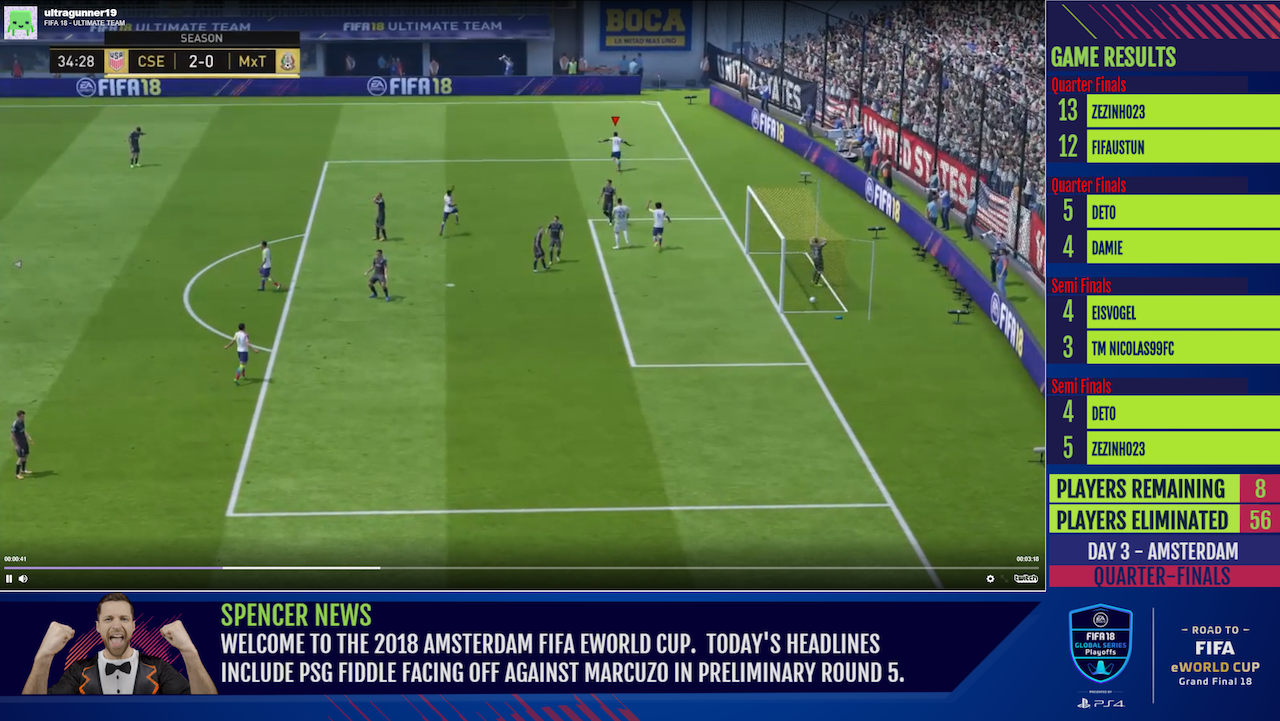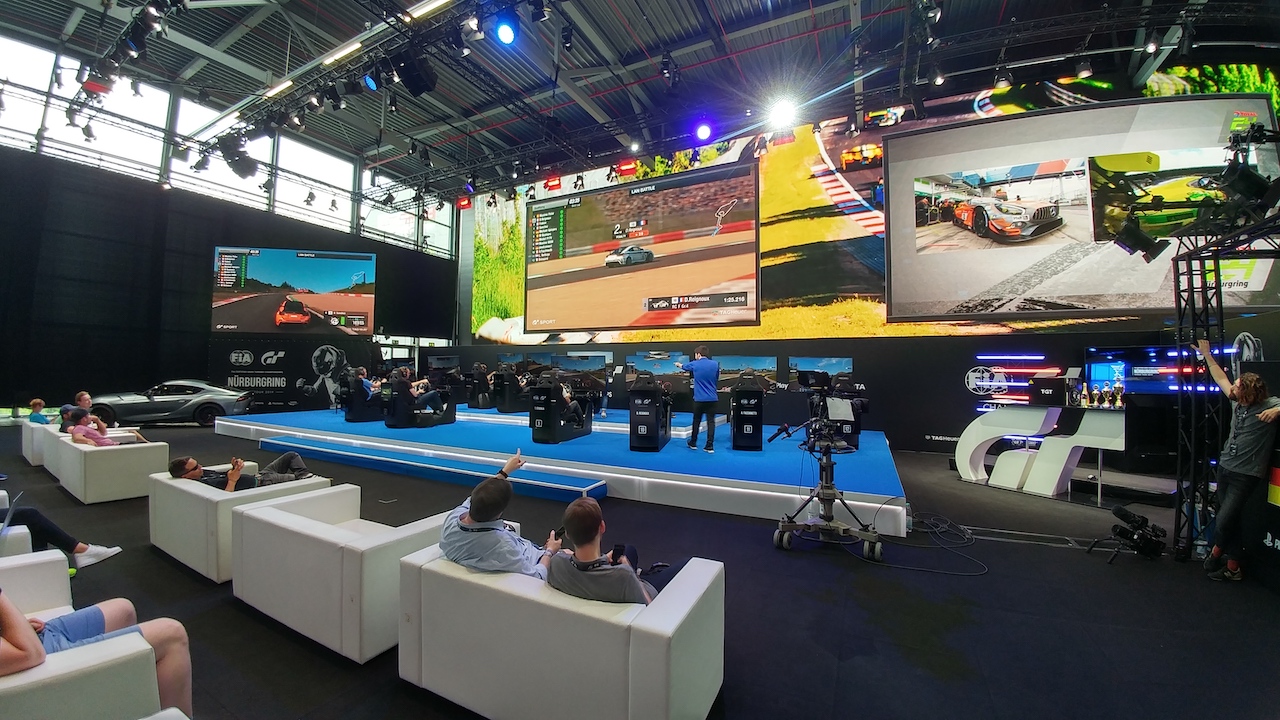Esports events are becoming more and more sophisticated. Both the in-venue experience and the broadcast/streaming presentation are taking on more professional production values and editorial enhancements and utilizing the finest production talent and gear. This is in direct response to the growing international popularity of esports. Around the world, spectacular venues such as Red Bull’s Hanger 7 in Salzburg, the legendary Nürburgring motorsports track in Germany, and Shanghai’s Mercedes Benz arena are hosting esports tournaments. As an industry, esports has exploded and is reaching fans on every continent. It is not unusual for events to have millions of dollars in prize pools, sell out major arenas, or have millions of fans watching on Twitch and YouTube.
On the surface esports production resembles other sports broadcasts: various mobile trucks, multiple cameras on jibs, slick video clips, impressive sets, and lighting. However, what distinguishes esports is the innovative use of graphics and the real-time data that populates those graphics. Esports are data-intensive and the need to organize and display data is required not only to make the events more visually compelling, but also to communicate fast-moving, complex information to fans.
Conveying and enhancing the excitement of esports to fans at the arena and to fans watching on their devices requires graphics that add important information about the players and teams and fully leverages the real-time aspect of these fast-moving games. Unlike conventional sports coverage that follows the action of a single game with two teams competing against each other, an esports event will involve several games being played over a two- or three-day period with multiple teams competing simultaneously against one another. The sheer complexity of esports and the fans’ demand for as much performance-related information as possible requires a new approach to data and graphics.
Bannister Lake, a Canadian software development company serving the broadcast and digital signage industries, has become a popular vendor serving the real-time data and visualization needs of esports productions. The company’s Chameleon data aggregation and management solution ingests multiple real-time data feeds, and allows producers to organize, edit, and moderate data content, and then populate graphics with customized data for display. Producers use Chameleon to simultaneously manage and display diverse sets of editorial content that enhance the fan experience. Virtually any data source can be incorporated into the production. In addition to XML or RSS feeds, topical event news generated by the tournament’s editorial teams, such as player profiles, standings, game schedules, and outstanding achievements, can be ingested through Google Sheets. This content may populate an L-Bar surrounding the game, providing additional editorial content that complements the action. Moderated social media content can be included to provide an interactive fan experience. Third-party feeds such as esports industry news, weather, and events calendars can also be included.

Chameleon can also manage advertising and sponsorship-related content, providing revenue opportunities for event producers. Sponsor logos can be triggered at appropriate times or branded content may appear within the L-Bar. The addition of game-related data pulled directly from the game’s API creates an entirely new level of excitement. Fans can view specific game-related data content aggregated, visualized, and displayed alongside the actual game. For serious fans looking for key stats, the visualization of API data adds a strong sense of engagement. Furthermore, game data can be coordinated to trigger other content when thresholds are met or when specific events occur. For example, if a team or player reaches a specific milestone, a special promotional ad may run automatically.
Bannister Lake brings a new approach to data management that enables a variety of production and editorial possibilities. The methodology revolves around the use of attaching key value pairs around a standard relational database. A typical sports database is made up of a series of standardized fields that corresponds to that particular sport and very rarely changes. Esports are dramatically different with datasets that vary from game to game and may or may not be used in production. Bannister Lake’s approach allows new tables to be added as a companion to the core data. The underlying methodology is to take these incoming diverse datasets and organize them in databases that allow for exceptionally fast recall. This creates a production solution that is more flexible and allows producers to editorially add or delete datasets on the fly, depending on the game, the audience, and the production’s editorial needs.
The solution’s API and Query functionality allows producers to take this further and distribute data content to specific end points. For example, fans who are following a team from Brazil could receive data only relevant to that team and receive customized ads and sponsorships centered on that market. Beyond in-venue signage and the broadcast streams, custom data can be distributed to web pages or mobile devices, enhancing the esports experience while opening up new market opportunities. It can also drive entirely new ways of conveying esports data such as augmented reality and virtual reality. Having more control over data, its management, and where it is ultimately distributed ushers in a new paradigm for engaging esports audiences.
As the broadcast and AV communities continue to experiment with big data, the challenge remains in how to strategically harness data and present it in ways that enhance storytelling and drive new revenue opportunities. The need for web-based solutions that can be implemented quickly in complex data-rich production environments, such as esports, is critical. It is only by taking full control of fast-moving data and marrying it with great graphic design that producers, sponsors, and, most importantly, fans, will fully capture the excitement and business potential of esports.
Vern Freedlander manages Bannister Lake’s strategic partnerships.
